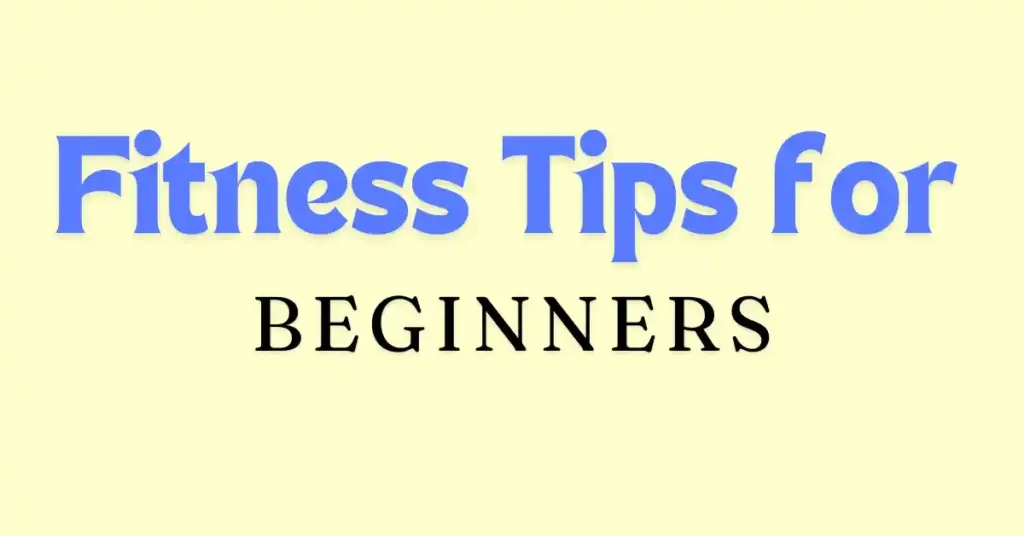Introduction
Are you ready to embark on an exciting fitness journey but feeling a bit overwhelmed? Don’t worry, you’re not alone! Starting a new fitness routine can be daunting, especially if you’re new to the world of exercise. But here’s the good news: with the right mindset and some fitness tips for beginners, you can set yourself up for success from day one.
In this comprehensive guide, we’ll walk you through everything you need to know to kickstart your fitness journey. From setting achievable goals to finding workouts you actually enjoy, we’ve got you covered. So, let’s dive in and discover how you can transform your life, one step at a time!
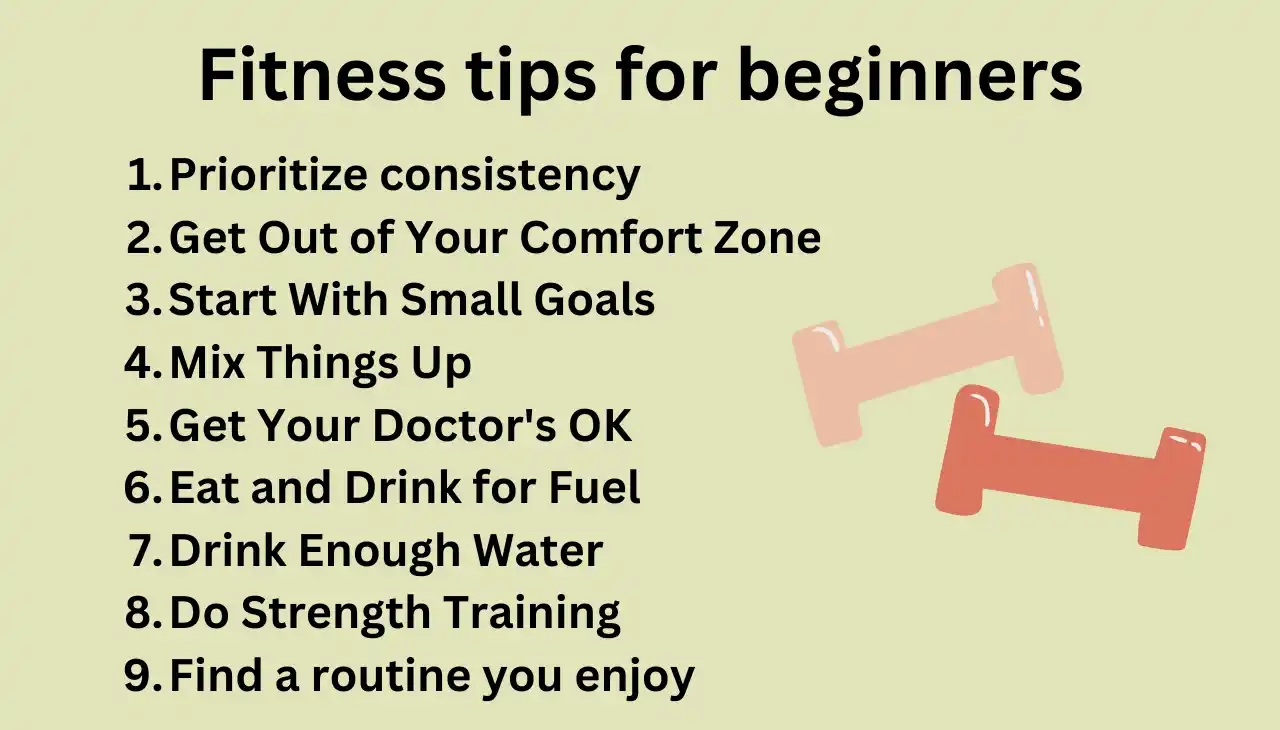
Best exercises to start your fitness journey
Starting your fitness journey with the right exercises can set a strong foundation for your progress.
- Bodyweight Exercises
- Push-Ups: Ideal for developing upper-body strength, particularly in the chest, shoulders, and triceps.
- Squats: Leg and glute strength have much improved.
- Lunges: Helps improve balance and targets the legs and glutes.
- Planks: Get ready to rock your core and take your stability to the next level.
- Cardio Exercises
- Walking or Jogging: Simple and effective for improving cardiovascular health.
- Jumping Jacks: An invigorating full-body exercise routine that gets your heart pumping and torches calories.
- Cycling: Ideal for developing leg strength and leg endurance.
- Strength Training
- Dumbbell Exercises: Start with light weights and perform exercises like bicep curls, shoulder presses, and dumbbell rows.
- Resistance Bands: Versatile and great for strength training without heavy weights.
- Flexibility and Mobility
- Yoga: Enhances flexibility, balance, and mental relaxation.
- Dynamic Stretching: Prepares your muscles for exercise and improves range of motion.
- High-Intensity Interval Training (HIIT)
- Short bursts of intense exercise: Followed by rest periods, HIIT is effective for burning calories and improving cardiovascular fitness.
- Core Exercises
- Bicycle Crunches: Targets the abdominal muscles.
- Leg Raises: Get ready to power up your lower abs and hip flexors with this move.
- Beginner Workout Plans
- Structured routines: Following a beginner workout plan can provide guidance and ensure balanced progress.
Fitness tips for beginners at home
Starting a fitness routine at home is a great way to improve your health and well-being.
- Set Clear Goals
- Define your objectives: Whether it’s losing weight, building muscle, or improving overall fitness, having clear goals will keep you motivated.
- Create a Routine
- Schedule your workouts: Consistency is key. Let’s aim for a fantastic 3-4 sessions per week.
- Mix it up: Include a range of workouts to target different muscle areas while keeping things interesting.
- Warm-Up and Cool Down
- Warm-up: Spend 5-10 minutes warming up with light cardio and dynamic stretches to prepare your body for exercise.
- Cool down: Finish with static stretches to help your muscles recover and improve flexibility.
- Start with Basic Exercises
- Bodyweight exercises: Push-ups, squats, lunges, and planks are great for beginners and don’t require any equipment.
- Follow online tutorials: There are many beginner-friendly workout videos available online.
- Use Simple Equipment
- Resistance bands: These are incredibly versatile and perfect for crushing your strength training workouts.
- Dumbbells: Start with light weights and gradually increase as you get stronger.
- Listen to Your Body
- Avoid overtraining: Give your muscles time to recover by incorporating rest days into your routine.
- Stay hydrated: Drink lots of water prior to, during, and after your workout.
- Stay Motivated
- Track your progress: Keep an exercise log or use a fitness app to track your progress.
- Find a workout buddy: Exercising with a friend may make exercises more fun and help you stay accountable.
- Nutrition Matters
- Eat a balanced diet: Fuel your body with a mix of proteins, carbohydrates, and healthy fats.
- Consider supplements: If needed, supplements like protein powder can help support your fitness goals.
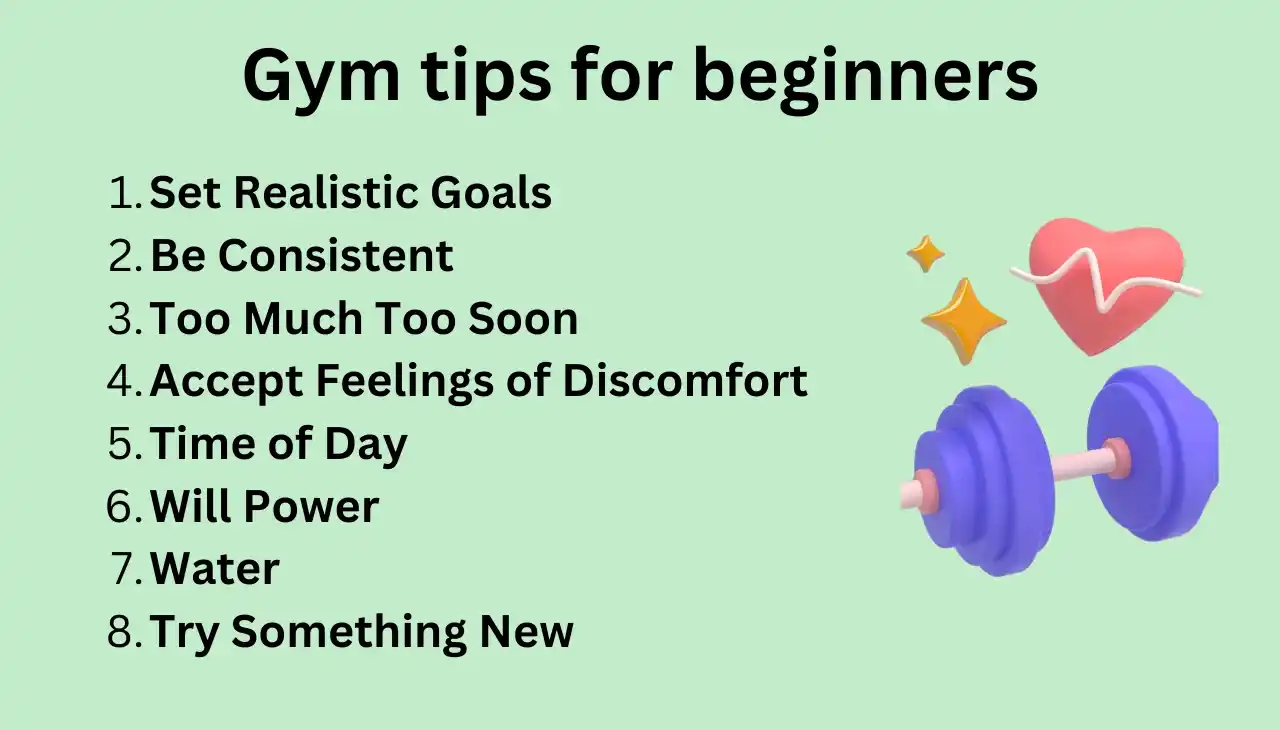
Fitness tips for daily routine
Including fitness in your everyday routine may dramatically enhance your overall health and well-being. Here are some practical tips to help you stay active every day:
- Morning Stretch
- Start your day with a stretch: Spend 5-10 minutes stretching to wake up your muscles and improve flexibility.
- Incorporate Movement Throughout the Day
- Take short breaks: Stand up, walk around, or do a few stretches every hour to avoid prolonged sitting.
- Use the stairs: Take the stairs whenever you can instead of hopping on the elevator.
- Home Workouts
- Quick workouts: Fit in a 15-20 minute workout session in the morning or evening. Bodyweight exercises like squats, push-ups, and planks are effective and require no equipment.
- Follow online classes: There are many free workout videos available online. For example, you might enjoy this 10-minute full-body workout by Fitness Blender.
- Stay Active with Daily Activities
- Household chores: Cleaning, gardening, and other chores can be great ways to stay active.
- Active commuting: If possible, walk or cycle to work or when running errands.
- Evening Relaxation
- Yoga or meditation: Spend 10-15 minutes doing yoga or meditation to relax your mind and body before bed.
- Healthy Habits
- Stay hydrated: Drink lots of water prior to, during, and after your workout.
- Balanced diet: Eat a variety of nutritious foods to fuel your body.
- Track Your Progress
- Use a fitness app: Track your daily activity and set reminders to stay active.
- Set small goals: Achieving small, daily goals can keep you motivated.
- Get Enough Sleep
- Prioritize rest: Aim for 7-9 hours of sleep each night to allow your body to recover and rejuvenate.
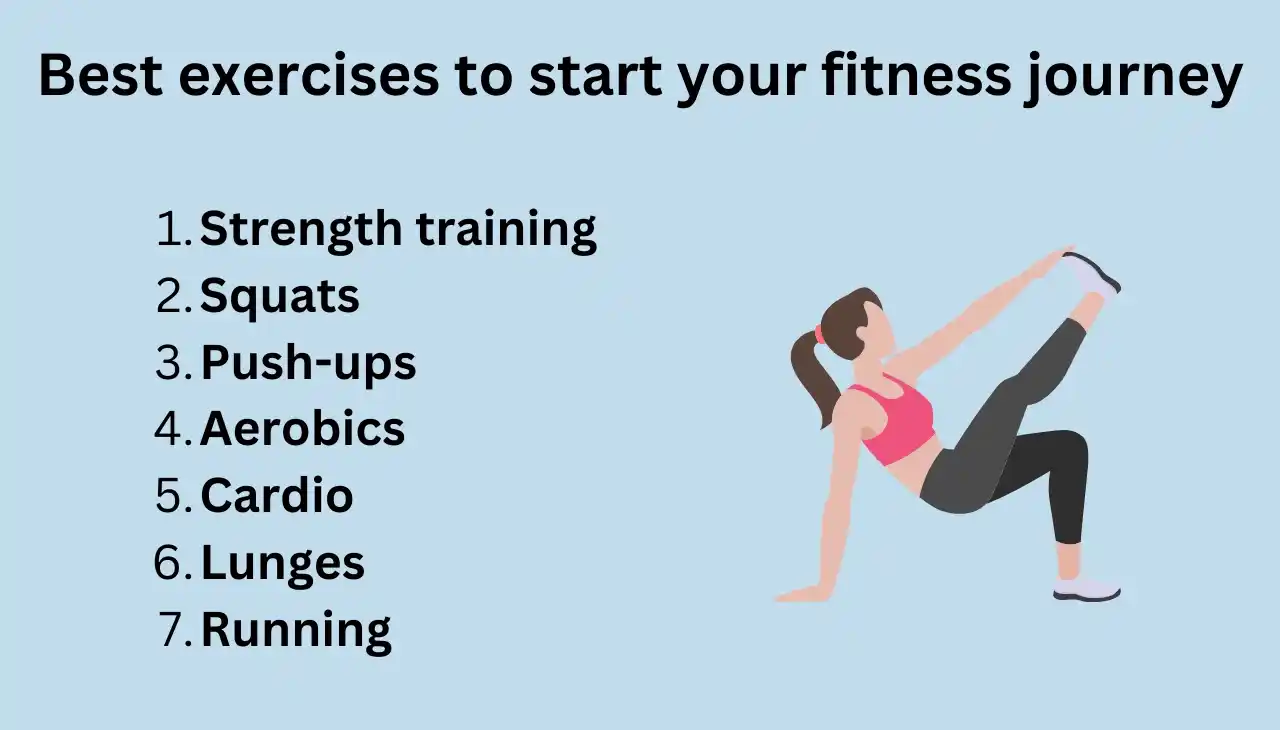
Fitness tips for beginners male
Starting your fitness journey may be both thrilling and fulfilling. Here are some tailored tips for beginner males to help you get started:
- Set Clear Goals
- Define your objectives: Whether it’s building muscle, losing weight, or improving overall fitness, having specific goals will keep you motivated.
- Create a Balanced Routine
- Strength training: Concentrate on complex exercises like squats, deadlifts, planks, bench presses, and rows. These exercises work multiple muscle groups and are great for building strength.
- Cardio: To promote cardiovascular health, incorporate sports such as jogging, cycling, and swimming.
- Flexibility and mobility: Include stretching or yoga to enhance flexibility and prevent injuries.
- Start with Basic Exercises
- Bodyweight exercises: Push-ups, squats, lunges, and planks are excellent for beginners and require no equipment.
- Dumbbell exercises: If you have access to dumbbells, start with exercises like dumbbell presses, rows, and curls.
- Warm-Up and Cool Down
- Warm-up: Spend 5-10 minutes warming up with light cardio and dynamic stretches to prepare your body for exercise.
- Cool down: Finish with static stretches to help your muscles recover and improve flexibility.
- Progress Gradually
- Increase intensity: Gradually increase the weight, reps, or duration of your exercises to continue making progress.
- Listen to your body: Avoid overtraining and allow your muscles time to heal.
- Nutrition and Hydration
- Balanced diet: Eat a mix of proteins, carbohydrates, and healthy fats to fuel your workouts.
- Stay hydrated: Drink lots of water prior to, during, and after your workout.
- Stay Consistent
- Schedule your workouts: Aim for at least 3-4 sessions per week and stick to your routine.
- Track your progress: Keep an exercise log or use a fitness app to track your progress.
- Seek Guidance
- Follow online tutorials: There are many beginner-friendly workout videos available online.
- Consider a trainer: If possible, working with a personal trainer can provide personalized guidance and help you achieve your goals safely.
Gym tips for beginners female
Starting your fitness journey at the gym can be empowering and fun! Here are some tips specifically for female beginners to help you get started:
- Set Clear Goals
- Define your objectives: Whether it’s building strength, losing weight, or improving overall fitness, having specific goals will keep you motivated.
- Create a Balanced Routine
- Strength training: Concentrate on complex exercises such as squats, deadlifts, planks, bench presses, and rows. These exercises work multiple muscle groups and are great for building strength.
- Cardio: Incorporate activities like running, cycling, or using the elliptical to improve cardiovascular health.
- Flexibility and mobility: Include stretching or yoga to enhance flexibility and prevent injuries.
- Start with Basic Exercises
- Bodyweight exercises: Push-ups, squats, lunges, and planks are excellent for beginners and require no equipment.
- Dumbbell exercises: If you have access to dumbbells, start with exercises like dumbbell presses, rows, and curls.
- Warm-Up and Cool Down
- Warm-up: Spend 5-10 minutes warming up with light cardio and dynamic stretches to prepare your body for exercise.
- Cool down: Finish with static stretches to help your muscles recover and improve flexibility.
- Progress Gradually
- Increase intensity: Gradually increase the weight, reps, or duration of your exercises to continue making progress.
- Listen to your body: Avoid overtraining and allow your muscles time to heal.
- Nutrition and Hydration
- Balanced diet: Eat a mix of proteins, carbohydrates, and healthy fats to fuel your workouts.
- Stay hydrated: Drink lots of water prior to, during, and after your workout.
- Stay Consistent
- Schedule your workouts: Aim for at least 3-4 sessions per week and stick to your routine.
- Track your progress: Keep an exercise log or use a fitness app to track your progress.
- Seek Guidance
- Follow online tutorials: There are many beginner-friendly workout videos available online.
- Consider a trainer: If possible, working with a personal trainer can provide personalized guidance and help you achieve your goals safely.
- Gym Etiquette
- Be mindful of others: Wipe down equipment after use and re-rack weights.
- Ask for help: Don’t hesitate to ask gym staff or fellow gym-goers if you need assistance with equipment or exercises.
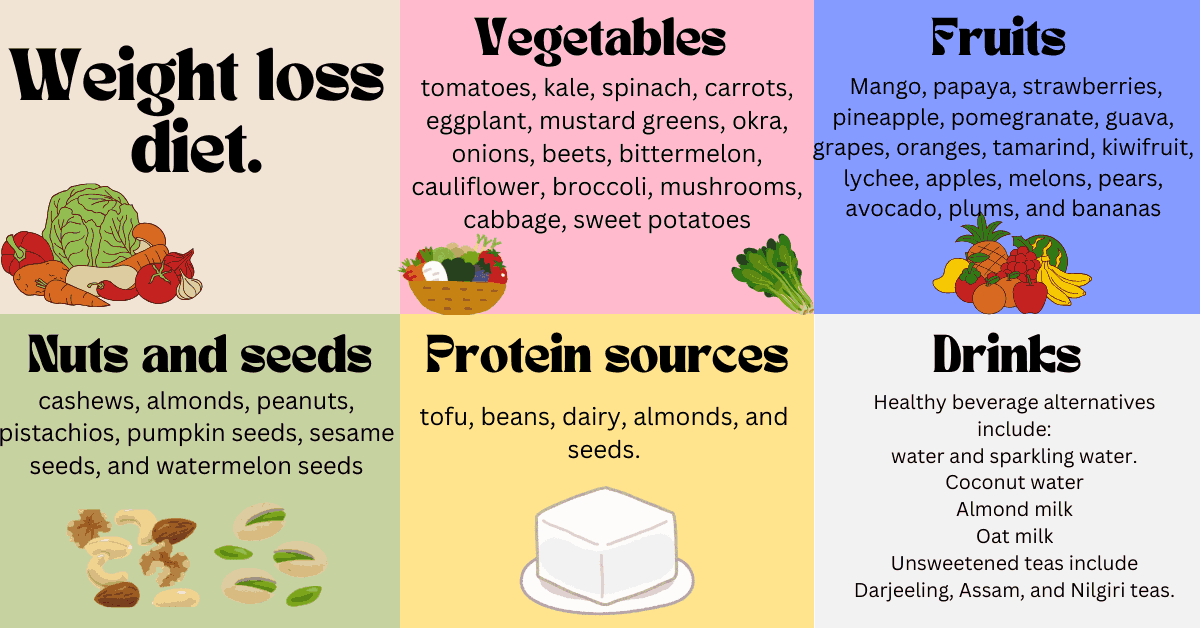
Gym tips for beginners weight loss
Starting a weight loss journey at the gym can be both exciting and challenging. Here are some tips to help beginners get started effectively:
- Set Realistic Goals
- Define your objectives: Whether it’s losing a certain amount of weight or improving overall fitness, having clear and achievable goals will keep you motivated.
- Create a Balanced Workout Routine
- Cardio exercises: Incorporate activities like running, cycling, or using the elliptical. Strive to squeeze in a minimum of 150 minutes of enjoyable and heart-pumping cardio each week.
- Strength training: Concentrate on complex exercises like squats, deadlifts, planks, bench presses, and rows. These exercises help build muscle, which can boost your metabolism.
- Flexibility and mobility: Include stretching or yoga to enhance flexibility and prevent injuries.
- Start with Basic Exercises
- Bodyweight exercises: Push-ups, squats, lunges, and planks are excellent for beginners and require no equipment.
- Dumbbell exercises: If you have access to dumbbells, start with exercises like dumbbell presses, rows, and curls.
- Warm-Up and Cool Down
- Warm-up: Spend 5-10 minutes warming up with light cardio and dynamic stretches to prepare your body for exercise.
- Cool down: Finish with static stretches to help your muscles recover and improve flexibility.
- Progress Gradually
- Increase intensity: Gradually increase the weight, reps, or duration of your exercises to continue making progress.
- Listen to your body: Avoid overtraining and allow your muscles time to heal.
- Nutrition and Hydration
- Balanced diet: Eat a mix of proteins, carbohydrates, and healthy fats to fuel your workouts.
- Stay hydrated: Drink lots of water prior to, during, and after your workout.
- Stay Consistent
- Schedule your workouts: Aim for at least 3-4 sessions per week and stick to your routine.
- Track your progress: Keep an exercise log or use a fitness app to track your progress.
- Seek Guidance
- Follow online tutorials: There are many beginner-friendly workout videos available online.
- Consider a trainer: If possible, working with a personal trainer can provide personalized guidance and help you achieve your goals safely.
- Gym Etiquette
- Be mindful of others: Wipe down equipment after use and re-rack weights.
- Ask for help: Don’t hesitate to ask gym staff or fellow gym-goers if you need assistance with equipment or exercises.
Fitness tips for beginners
- S.M.A.R.T. Goals for Fitness Journey
- The acronym meaning Specific, Measurable, Achievable, Relevant, and Time-bound is S.M.A.R.T.
- Small, manageable goals are crucial for building confidence and maintaining motivation.
- Examples of small goals for beginners include walking for 15 minutes daily, performing 10 push-ups three times weekly, and trying a new healthy recipe every weekend.
- Celebrate small victories as they are the foundation for future success.
- Incorporating Movement into Daily Life
- Sneak in exercise throughout the day, not just in a gym.
- Simple ways to increase daily activity include taking stairs, parking farther, having “walking meetings,” and doing squats while brushing teeth.
- Daily movement is not just about burning calories, but creating a lifestyle that prioritizes activity and energizes.
- It’s a great way to ease into a structured fitness routine.
- Consistency Over Intensity in Fitness
- Quality over quantity is key to long-term fitness success.
- A moderate 30-minute workout three times a week is recommended.
- Beginners should aim for three 30-minute sessions per week.
- Consistent workouts build habits, crucial for long-term fitness success.
- Choosing Enjoyable Workouts
- Focus on the Fun Factor: Find activities that you enjoy to avoid boredom.
- Explore Different Exercise Types: Dance classes, group fitness classes, outdoor activities, and team sports.
- Mix It Up: Be open to trying new things and find activities that make you look forward to moving your body.
- Warm-Up and Cool-Down Techniques for Injury Prevention
- Importance of proper warm-up and cool-down in workouts.
- Warm-up exercises include light jogging, arm circles, leg swings, and dynamic stretches.
- Cool-down techniques aid recovery with gentle muscle stretching, deep breathing exercises, and light walking.
- Proper warm-up and cool-down routine can prevent injury and discomfort.
- Fitness Beginner Nutrition
- Fuel Your Body Right: Proper nutrition is crucial for supporting fitness routines.
- Essential Nutrients for Fitness Beginners: Carbohydrates, Proteins, and Healthy Fats.
- Hydration: Drinking at least 8 glasses of water daily, especially during workouts, can improve performance, reduce fatigue, and prevent injuries.
- Fitness Apps for Beginners
- Utilize apps as personal trainers, nutritionists, and cheerleaders.
- Features include workout tracking, calorie counting, goal setting, and community support.
- Popular fitness apps for beginners include MyFitnessPal, Couch to 5K, and Nike Training Club.
- Remember technology is a tool to support your fitness journey, not replace hard work.
- Building a Fitness Community for Beginners
- The power of community in fitness is highlighted.
- A fitness support system provides accountability, motivation, and knowledge sharing.
- Finding a fitness tribe can be achieved by joining local fitness groups, online forums, or social media groups.
- It’s important to remember that everyone started as a beginner and connect with others to make great friends.
- Fitness Beginner Expectations
- Understand that fitness transformations don’t happen overnight; they require consistent effort.
- Avoid the comparison trap by focusing on personal journeys and celebrating personal victories.
- Celebrate small wins like gym visits, increased reps, and increased energized ness.
- Remember that fitness is a marathon, not a sprint; enjoy the journey and trust the process.
- Beginner Workouts: Listening to Your Body
- Tuning into Body’s Signals: Understanding body signals is crucial for injury prevention and workout optimization.
- Signs Needing Rest: Sharp or persistent pain, dizziness, extreme fatigue, irregular heartbeat.
- Importance of Rest and Recovery: Rest days are essential for muscle repair and strength growth.
Conclusion
Starting a fitness routine is an incredible journey towards a healthier, happier you. Prioritize consistency over intensity, choose workouts you enjoy, warm up and cool down, fuel your body with proper nutrition, use technology to stay motivated, build a supportive community, set realistic expectations, and listen to your body. Remember, every expert was once a beginner, and embrace your journey, celebrating your progress and having fun. Your future self will thank you for the gift of health and fitness you’re giving yourself today.
FAQ
I'm completely new to exercise. How frequently should I workout as a beginner?
A: As a beginner, it's important to start slowly and gradually increase your activity level. Aim for about 3-4 days of exercise per week, with each session lasting 20-30 minutes. This could include a mix of cardio (like brisk walking or cycling) and basic strength training exercises. Remember that regularity is more crucial than intensity when you first start out. Listen to your body and give yourself rest days between workouts to allow for recovery. As you build stamina and strength, you can gradually increase the frequency, duration, and intensity of your workouts.
I'm feeling sore after my workouts. Is this typical, and how should I handle it?
Some muscle soreness after working out, especially when you're new to exercise or trying a new routine, is completely normal. This is often called Delayed Onset Muscle Soreness (DOMS) and typically peaks 24-48 hours after exercise. To manage soreness: 1. Stay hydrated, 2. Get enough sleep, 3. Try light stretching or yoga, 4. Use a foam roller for self-massage, 5. Take a warm bath with Epsom salts. If the pain is sharp, severe, or lasts more than a few days, consult with a healthcare professional. Remember, while some soreness is normal, pain is not – always listen to your body.
I'm not losing weight despite working out regularly. What am I doing wrong?
Weight reduction is a difficult process that requires more than simply exercise. If you're not seeing results despite regular workouts, consider these factors: 1. Diet: You might need to adjust your eating habits. Remember, weight loss often comes down to calories in vs. calories out. 2. Sleep: Lack of sleep can hinder weight loss efforts. 3. Stress: High stress levels can affect weight loss. 4. Workout intensity: You might need to increase the intensity or vary your routine. 5. Patience: Sometimes, the scale doesn't reflect changes immediately. You might be gaining muscle while losing fat. Consider tracking your food intake, ensuring you're getting enough sleep, and perhaps consulting with a nutritionist or personal trainer for personalized advice.
Is it preferable to exercise in the morning or in the evening?
The greatest time to exercise is one that you can regularly keep to. Both morning and evening workouts have their benefits: Morning workouts: 1. Can boost metabolism for day 2. Often leads to better sleep at night 3. Might be easier to stick to before the day gets busy. Evening workouts: 1. You might have more energy after eating throughout the day. 2. Can be a great way to de-stress after work. 3. Your body temperature is higher, potentially reducing injury risk. Ultimately, choose a time that fits your schedule and feels good for your body. The most important thing is consistency, regardless of the time of day.
Do I need to buy special equipment or join a gym to start my fitness journey?
Not at all! While gyms and equipment can be helpful, they're not necessary to start your fitness journey. Many excellent workouts may be completed with only your body weight. Here are some ideas for equipment-free exercises: 1. Bodyweight exercises: Push-ups, squats, lunges, planks. 2. Cardio: Walking, jogging, stair climbing. 3. Yoga: Many free yoga videos are available online. 4. Home objects: Use water bottles as weights, a sturdy chair for step-ups or tricep dips. As you progress, you might want to invest in some basic equipment like resistance bands or dumbbells, but these aren't necessary to get started. Remember, the most important "equipment" is your commitment and consistency!
